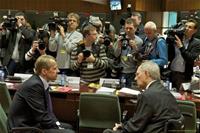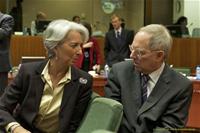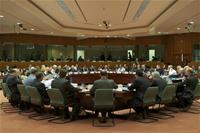Fiscal sovereignty or stability for all
Ralitsa Kovacheva, May 21, 2010
 On Friday the special task force, led by the president of the European Council Herman van Rompuy, is gathering together to discuss reforms in the economic governance of the European Union. The group consists of representatives of the Member States as well as of the Commission and the European Central Bank. Van Rompuy's ambition is the group to end its work until the European Council in October.
On Friday the special task force, led by the president of the European Council Herman van Rompuy, is gathering together to discuss reforms in the economic governance of the European Union. The group consists of representatives of the Member States as well as of the Commission and the European Central Bank. Van Rompuy's ambition is the group to end its work until the European Council in October.
On May 12 the European Commission presented its visions for tough fiscal control and economic coordination within the EU. The most disputed proposal foresees Member States to present in the beginning of the each year their draft budgets in Brussels and, if necessary, to correct them accordingly with the recommendations of the Council of Ministers. The European Voice newspaper reports of a strong resistance against this proposal, expressed during the Ecofin meeting on May 18.
The new British Minister of Finance George Osborne was especially critical,  saying that he would not accept the Commission to take over national parliaments' role to hear the budgets first. The newspaper quotes diplomats, saying that the Ministers of Finance of France Christine Lagarde, Austria Josef Proell, Sweden Anders Borg and Denmark Claus Hjort Frederiksen also expressed their worries with the proposal.
saying that he would not accept the Commission to take over national parliaments' role to hear the budgets first. The newspaper quotes diplomats, saying that the Ministers of Finance of France Christine Lagarde, Austria Josef Proell, Sweden Anders Borg and Denmark Claus Hjort Frederiksen also expressed their worries with the proposal.
However, the president of the Eurogroup Jean-Claude Juncker supported it, saying it was important when national parliaments make decisions (about budgets) to be well informed about the situation in the rest of the euro area members.
It is not quite clear what position has the deputy Minister of Finance of Bulgaria Ana Mihaylova expressed. From the Ministry's press release it becomes clear only that "an early review of the indicative budgets has been approved (of Member States) by the European Commission. This approach would help early detection of risks which should be taken into account during the preparation of national budgets".
 In the official conclusions of the meeting it is said that the Council "calls" for a regular assessment and a partnership check of Member States' fiscal frameworks, taking into account the good practices and differences in the political, institutional and cultural context. It explicitly stipulates that there are members with a successful financial policy and that there is no universal solution for all countries, therefore all national specifics should be taken into account.
In the official conclusions of the meeting it is said that the Council "calls" for a regular assessment and a partnership check of Member States' fiscal frameworks, taking into account the good practices and differences in the political, institutional and cultural context. It explicitly stipulates that there are members with a successful financial policy and that there is no universal solution for all countries, therefore all national specifics should be taken into account.
The European Voice also published a commentary, entitled "The end of fiscal sovereignty in Europe". The author is the Nobel prize laureate Michael Spence. He writes that "the challenge now is to achieve a combination of discipline and flexibility that protects the collective interest. That will involve a loss of full fiscal sovereignty, but facing up to that reality is required to sustain the monetary union".